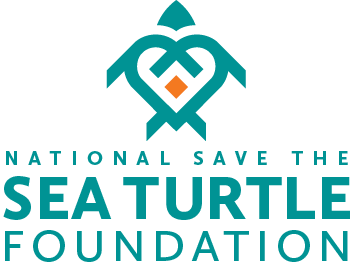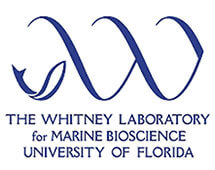
The University of Florida’s Whitney Laboratory for Marine Bioscience and Sea Turtle Hospital: Advancing Sea Turtle Disease Research
David Duffy, Ph.D.
Assistant Professor of Wildlife Disease
Genomics.The Whitney Laboratory for Marine Bioscience and Sea Turtle Hospital, University of Florida, St. Augustine, Florida 32080, USA.
Genomics.The Whitney Laboratory for Marine Bioscience and Sea Turtle Hospital, University of Florida, St. Augustine, Florida 32080, USA.
Department of Biology, College of Liberal Arts and Sciences, University of Florida, Gainesville, Florida, 32611, USA.
The University of Florida’s Whitney Laboratory for Marine Bioscience and Sea Turtle Hospital (www.whitney.ufl.edu) is located on Florida’s Atlantic coast near historic St. Augustine. This research institute is a hive of activity, conducting cutting-edge marine bioscience and conservation research and training, and extensive public outreach activities. The marine research carried out here is greatly facilitated by its unique location, bordering sea turtle nesting beaches to its east and extensive brackish estuarine and mangrove habitats to its west. The institute conducts basic biological research of marine organisms and environments to better understand marine animals and to apply novel results to problems of human health, natural resources and environmental conservation.
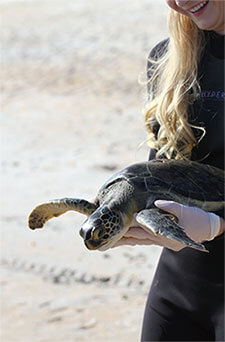
Key areas of focus at the Whitney Lab include understanding the evolution of animal form and function; how genetic programs regulate every aspect of animal life and how disease occurs when these programs are perturbed; understanding cellular development and the evolution of animal traits; understanding human senses using marine models; conducting drug discovery from environmental sources; and improving coastal conservation and habitat restoration (www.whitney.ufl.edu/conservation--sea-turtle-hospital/citizen-science-projects/oyster-restoration-initiative and www.whitney.ufl.edu/conservation--sea-turtle-hospital/clams).
For the last five years the institute has had a renewed focus on the protection of sea turtles, with the opening of our Sea Turtle Hospital in 2015 (www.whitney.ufl.edu/conservation--sea-turtle-hospital). Unfortunately, as with the human Covid-19 pandemic, sea turtles globally are suffering from a pandemic of their own, fibropapillomatosis, which is caused by the destructive combination of viral infection and environmental degradation. Our hospital rehabilitates stranded sea turtles, from post-hatchlings to adults and has particular expertise in rehabilitating sea turtles suffering from the fibropapillomatosis tumor disease. Having our hospital embedded in an active research institute offers unique opportunities to research this disease as well as the rehabilitation process. We can provide direct conservation services to individual turtles, while simultaneously enabling broader research to better understand population-level events. To obtain information that is widely relevant to the conservation of diverse sea turtle populations, we also partner with other rehabilitation facilities and researchers throughout the state and beyond.

National Save The Sea Turtle Foundation Support
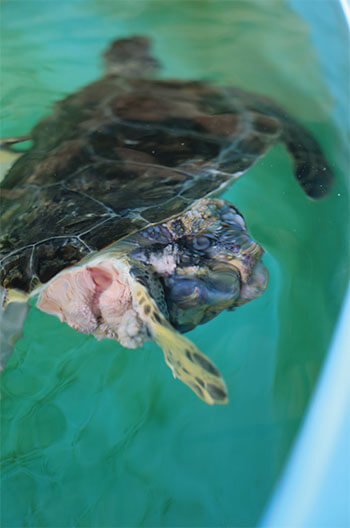
A young green sea turtle with large fibropapilloma
tumors will undergo treatment at Whitney Lab’s Sea
Turtle Hospital.
tumors will undergo treatment at Whitney Lab’s Sea
Turtle Hospital.
Fibropapillomatosis is continuing to spread globally including throughout US regions beyond Florida. For instance, between 2009 and 2018, fibropapillomatosis prevalence in stranded green sea turtles in Texas has gone from 0% to 35%, while in Florida, greens fibropapillomatosis prevalence also continues to rapidly increase, now standing at over 40% in stranded turtles. We are pioneering a novel approach to fibropapillomatosis in Florida’s sea turtles, wildlife precision oncology, which draws heavily from emerging human medicine genomic approaches. This precision medicine approach has already provided unprecedented insights into this sea turtle disease. Our work on external fibropapillomatosis tumors has proven that they share many genetic similarities to human cancer types, most prominently human skin cancers. Our profiling of tumor genomes has also successfully identified drug treatments for fibropapillomatosis. Furthermore, our novel approaches to fibropapillomatosis have enabled us to obtain new information about how the fibropapillomatosis-associated herpes virus is shed into the water column and the environmental factors triggering this disease. We are also resolving the specific uncertainty about how the herpes virus interacts with the turtle immune system to give rise to tumors.
Without improved understanding of this disease and its environmental trigger, treatment, containment and mitigation options are severely hampered. Therefore, with funding generously provided from the National Save The Sea Turtle Foundation (NSTSTF) for the Fibropapillomatosis Training and Research Initiative (FTRI), the Whitney Lab and Sea Turtle Hospital and our collaborators are addressing crucial knowledge gaps in our understanding of fibropapillomatosis. We are applying cutting-edge techniques from human cancer research to reveal the environmental drivers of fibropapillomatosis, the dynamic interactions between the herpes virus and its turtle hosts and novel treatment and management strategies. FTRI is helping to support three studentships, enabling students to be trained in ultra-modern approaches, meaning that they will be poised to tackle not only fibropapillomatosis, but the host of wildlife diseases predicted to emerge over the coming decades.
Building Future Capacity
Unfortunately, marine turtles are not immune to the growing number of threats and increasing rates of wildlife disease. Therefore, in addition to training and research expansions, the Whitney Lab is preparing to meet future challenges by undertaking capital investment in a new sea turtle hospital building and research laboratories. The project will provide a state-of-the-art www.whitney.ufl.edu/articles/expanding-our-facilities-to-meet-research-and-conservation-demands.html Nancy Condron Family Sea Turtle Research Center and Hospital, to secure our sea turtle activities. This ambitious project will greatly expand our capacity for rehabilitating sea turtles as well as further improve our research and training capabilities. Although plans are well advanced, gifting and naming opportunities for the new institute still exist https://www.whitney.ufl.edu/articles/expanding-our-facilities-to-meet-research-and-conservation-demands.html, with construction of Phase One scheduled to commence shortly.
It is vital that we continue to improve how we tackle wildlife diseases and that we train large numbers of researchers and clinicians in how to apply these techniques as sea turtle and wildlife disease events are predicted to occur at greater frequency over the coming decades, due to ongoing detrimental human activities. Wildlife pathogens have been shown to exacerbate the effects of environmental degradation, habitat loss and the climate emergency on population levels, potentially leading to deteriorated health and eventually to local and global extinctions. Furthermore, in a vicious feedback loop, as the risk of extinction increases for a given species, the detrimental effect of disease on the population worsens. Human activities are not only stressing habitats, but the rapid environmental changes induced by these activities are also likely to be increasing cancer rates in wild populations. With a predicted rise in the number and incidence of diseases affecting wildlife populations set to soar in coming decades, NSTSTF-supported programs such as our FTRI are crucial to improving our ability to respond to wildlife pandemics, and ensure the health of sea turtles and other keystone species.
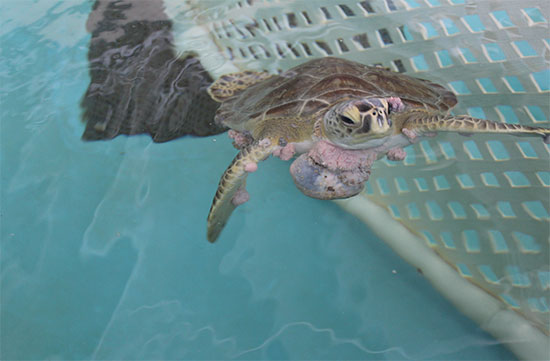
The National Save The Sea Turtle Foundation Fibropapillomatosis Training and
Research Initiative (FTRI) at the the Whitney Lab and Sea Turtle Hospital is
addressing crucial knowledge gaps in our understanding of fibropapillomatosis.
Research Initiative (FTRI) at the the Whitney Lab and Sea Turtle Hospital is
addressing crucial knowledge gaps in our understanding of fibropapillomatosis.
Helping Sea Turtles Survive for 39 Years
A NON-PROFIT ORGANIZATION
State of Florida Registration Number CH-2841 | Internal Revenue Code 501 (c) (3)
Web Design & Development by Web Expressions, LLC
